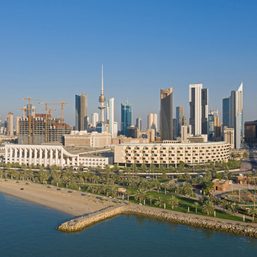SUMMARY
This is AI generated summarization, which may have errors. For context, always refer to the full article.
![[OPINION] Immigration and obscurity: A reflection on working overseas](https://www.rappler.com/tachyon/2024/01/immigration-obscurity-january-24-2024.jpg)
There is a strong likelihood that once a person immigrates to a foreign country, that such person will undergo a degree of obscurity in that new home. This is not always the case as there are famous immigrants such as actors (Natalie Portman, Arnold Schwarzenegger), corporate leaders (Google’s Sergey Brin), scientists (Albert Einstein), musicians (Bob Marley), and such.
Closer to home, there are well-known Filipino immigrants such Maria Ressa, Jose Garcia Villa, and Rachel Ann Go. But they are the exceptions.
Most immigrants are enveloped with anonymity in their new home. This is not necessarily a bad thing nor a disadvantage. But it is part of the reality one has to contend with when relocating abroad.
Friends in a bar in a faraway land
On a chilly Thursday evening, I found myself chatting in a cozy bar and restaurant in the middle of Washington, DC with Filipino lawyer-friends who are working in the area. As in years past, we talked, drank, ate, and always had wonderful experiences socializing and reminiscing. One topic we casually discussed was – comparing the spans of our legal careers with our contemporaries from UP and Ateneo Law Schools back home – there is considerable obscurity which immigrants generally encounter.
We philosophized on “what could have beens.” Where we would have ended up had we gone back home after our respective Masters programs (LL.M.) or if we have never immigrated to the US or elsewhere at all. Would we have been elected as partners of the large law firms we were working for before we left? Would we have served as General Counsels (GCs) of large companies? Would we have been running legal departments at this time? Started businesses? Or would some of us have served in elective or appointive government positions? Our storylines and career trajectory would have surely been different.
As in any profession, people tend to look and see where their friends or contemporaries are and how far they have fared. Yes, it is not always productive to be comparing because of the notion that people have their own timing and timetable. No one is really late in reaching this or that milestone as it all depends on the individual’s circumstances, fate, and effort.
Then again, in freewheeling discussions among lawyer-friends (note: you can easily substitute for nursing-friends, doctor-friends, engineer-friends, school mates, college buddies, roommates or province mates), it is commonplace to talk about other colleagues’ accomplishments particularly in a safe and relaxed environment. You are with Filipino friends anyway in a faraway land.
Obscure life abroad
One main topic discussed is the degree of obscurity overseas. When you move to another country, whether it is for work or further studies, one normally succumbs to the trappings of obscurity. It’s not by design as it just happens. With further studies, developed expertise, and the Asian work mentality, one can indeed go further up the corporate or societal ladder. But considering the vast size of your employer or the vast sea of your industry, it is still very conceivable to feel and actually be anonymous.
Being obscure does not mean no one knows you. Being anonymous does not mean you are not accomplished. On the contrary, your colleagues, clients, and management teams know you and the work output you produce. But you are just one of the many.
In the case of my DC circle of lawyer-friends, we are but several of the many lawyers in our respective companies. Or just one of many law practitioners (or just one of the many nurses, doctors, engineers, teachers) in our chosen field.
Obscurity as a liberating gift
Obscurity in a large and expansive country like the US is not at all bad. It can be a gift and can be liberating.
I was once conversing with a friend from my former law firm in Makati City who completed the LL.M. program at Harvard. He is a California-based attorney. He and I discussed our career paths many years after leaving the country. He told me, which I fully support, that coming to a new country like the US allows a Filipino lawyer to go into any direction or field he would like to be in.
There is that freedom to mold your future in a foreign country. That you can reinvent and reengineer yourself into the lawyer, law practitioner, or other professional you truly want to become. You can work in almost any profession or job, and you may or may not use your legal training or lawyer background. With little to no judgment from peers and other people. There is no pressure to be a law firm partner. There is “no deeply embedded notion of what success in the legal profession looks like” when abroad.
Reverence to professions and the ‘titulado’ mindset
Back home, lawyers and other professionals are typically bestowed with all sorts of prominence and reverence. Perhaps because of the “titulado” concept: professionals in the Philippines are called Attorney Reyes, Engineer de la Cruz, Dr. San Diego, Architect Garcia, and so forth. There is much emphasis on titles. Banners are set up whenever they pass the board or bar exams. Being a board or bar topnotcher is a useful tagline throughout their professional careers.
The abbreviated designation “Atty.” is a currency to be capitalized on. But in the US, apart from doctors, professionals are simply called Mr. or Ms. something. You don’t really use “Esq.” and neither does it matter. You can be working with or for someone for some time and yet they do not even realize the higher level of education you have attained.
Talking to lawyer-contemporaries who chose to stay in the country, they are for the most part highly successful law firm partners, GCs of prominent companies, heads of legal departments, working in the government, teaching in law schools, or run their own law firms. Others started their own business or ventured into an industry related to the legal profession. Absolutely a great job by these fine people.
They are able to leverage the various connections they innately have – their close circle of friends, their classmates and dormmates, the alumni of their school clubs and Greek letter organizations, the friends of their family, parental contacts, the people they grew up with, and the list goes on…and on.
As a result of their hard work and higher level of education, coupled with built-in connections and the Filipino reverence for professional titles, they elevate their professional practice and businesses to greater heights. Prominence will vary by individual professional but they are rarely obscure.
More freedom in various career paths for professionals abroad
The difference in the US and other countries is that an immigrant lawyer (or immigrant doctor, nurse, engineer, teacher, and others) can choose to work in almost any field. It can be work for a law firm, in legal compliance and operations, for a non-profit entity, for a large multinational, for a Human Rights defender, for international organizations, in a CPA firm, in the consulting world, in banking, for a school or university, and many other areas. Work can be performed as a full-fledged and bar-admitted lawyer, as a paralegal, as a CPA, or as a corporate officer with no requirement of a law degree. There is professional and career freedom which is not necessarily found back home.
A comparative analysis between an immigrant professional’s career abroad versus a contemporary who chose to stay in the country is inevitable. As first-generation immigrants are still very much connected to the people, politics and happenings back home, it is inevitable to be curious on how your origin country is doing and what your friends have been up to. It is but human nature to compare.
One thing for certain though is that after comparing – then justifying and reasoning out as to why immigrant professionals are still abroad – the individual immigrant will still do what he or she believes is best for the family, career, lifestyle, well-being, and happiness.
If for some reason immigrant professionals feel they are missing out on the “what could have beens” back home, note that there are others who chose to stay in the country but are wondering if staying was the right thing to do and rethinking if they can work overseas.
The immigrant journey comprising of persistent visa challenges, educational successes, board/bar exam trials, professional sacrifices and promotions, children’s schooling and better future, relative economic stability, personal difficulties, loneliness, homesickness, and life rebuilding, is something that cannot be replicated back home. The immigrant journey is humbling and fulfilling. It is a journey worth taking.
At bottom, this is just life and the choices we make for betterment. – Rappler.com
Carlo Osi is an Adjunct Professor of Law at Georgetown University and NYU School of Law. He works in the tax operations and consulting industry as the US Payroll Tax Director of the largest hotel chain in the world. He lives and works on the East Coast.
Add a comment
How does this make you feel?
![[OPINION] We are forgotten: On OFWs and mental health](https://www.rappler.com/tachyon/2021/09/ispeak-ofw-depression-1280.jpg?fit=449%2C449)





There are no comments yet. Add your comment to start the conversation.